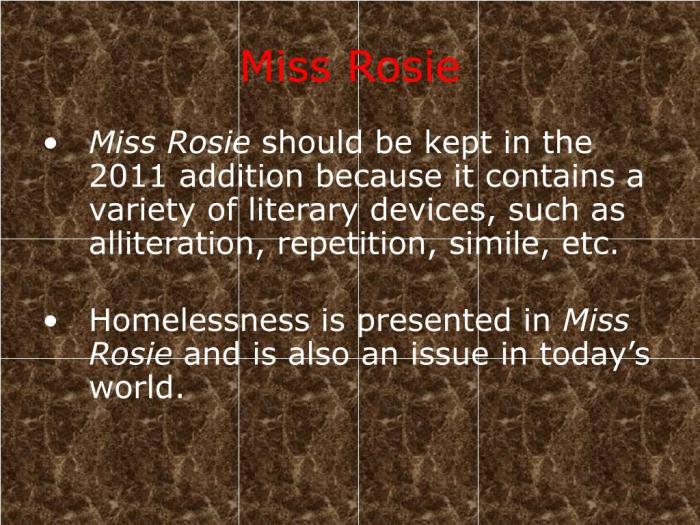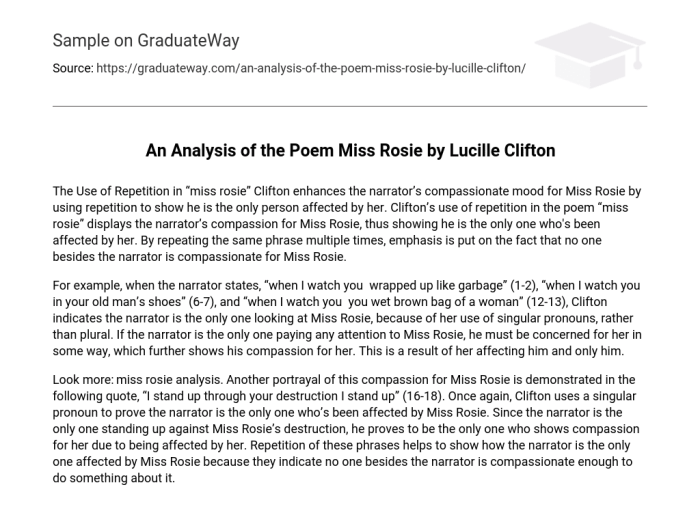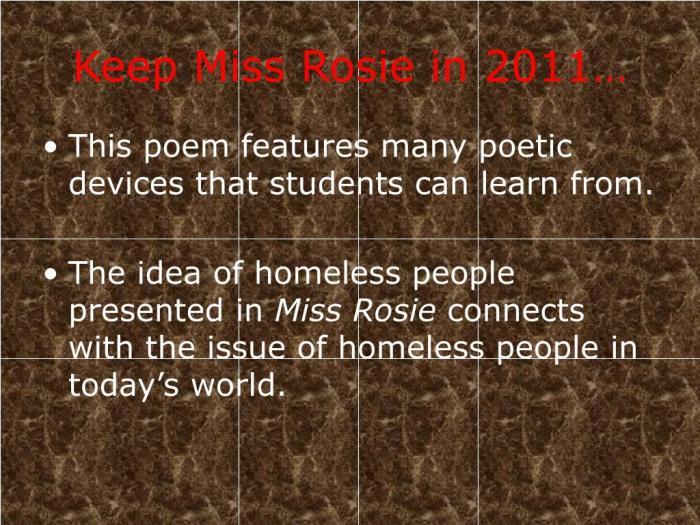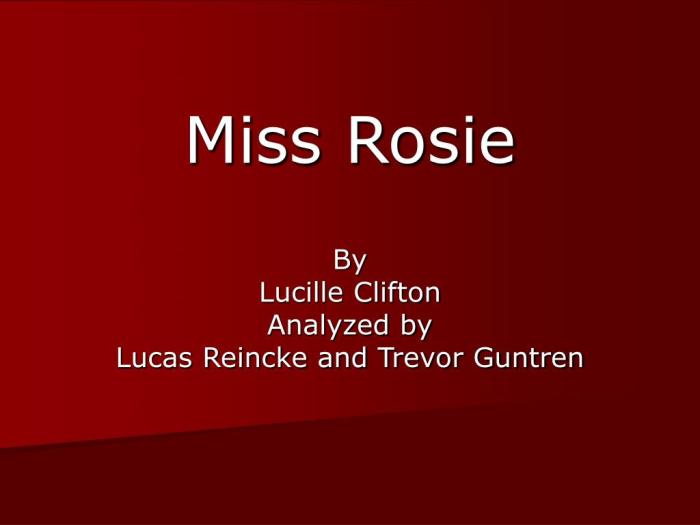Miss rosie by lucille clifton – In Lucille Clifton’s poignant poem, “Miss Rosie,” readers are invited to encounter a character whose life and experiences illuminate the complexities of identity, belonging, and the human condition. Through vivid imagery and a profound exploration of social issues, Clifton paints a powerful portrait that resonates deeply with readers.
The poem delves into the life of Miss Rosie, a woman who embodies the struggles and triumphs of marginalized communities. Her physical appearance, personality, and interactions with others serve as symbols that reveal the complexities of her identity and the challenges she faces.
Introduction

Lucille Clifton’s poem “miss rosie” is a powerful and moving tribute to the resilience and strength of Black women in the face of adversity. The poem explores themes of racism, poverty, and the importance of community.Clifton uses vivid imagery and symbolism to create a vivid portrait of miss rosie, a Black woman who has faced countless challenges in her life.
Despite these challenges, miss rosie remains a strong and proud woman who is determined to overcome the obstacles she faces. The poem is a testament to the strength and resilience of Black women and the importance of community in the face of adversity.
Themes
- Racism: The poem explores the ways in which racism has impacted miss rosie’s life. miss rosie has faced discrimination and prejudice from white people throughout her life, and these experiences have shaped her identity and her view of the world.
- Poverty: The poem also explores the ways in which poverty has impacted miss rosie’s life. miss rosie lives in a poor neighborhood and struggles to make ends meet. Her poverty has limited her opportunities and made it difficult for her to provide for herself and her family.
- Community: The poem also explores the importance of community in the face of adversity. miss rosie has a strong support system of friends and family who help her through difficult times. Her community is a source of strength and resilience for her, and it helps her to overcome the challenges she faces.
The Character of Miss Rosie
Miss Rosie is a complex and enigmatic figure in Lucille Clifton’s poem. Her physical appearance is striking, with her “long black hair” and “dark eyes.” She is also described as being “tall and thin,” with a “sad smile” that hints at a deeper inner turmoil.
Miss Rosie’s personality is equally complex. She is both strong and vulnerable, independent yet yearning for connection. She is a survivor who has faced adversity, but she is also a dreamer who longs for a better life. Her character is a testament to the resilience of the human spirit, even in the face of hardship.
Symbolism behind Miss Rosie’s Character, Miss rosie by lucille clifton
Miss Rosie is more than just a character in a poem; she is also a symbol of the many women who have struggled and persevered in the face of adversity. Her long black hair represents her strength and resilience, while her dark eyes suggest her inner depth and wisdom.
Her sad smile is a reminder of the pain and suffering that many women have endured, but it is also a sign of hope and determination.
Miss Rosie’s character is a reminder that even in the darkest of times, there is always hope. She is a symbol of the strength and resilience of the human spirit, and her story is an inspiration to us all.
Miss Rosie’s Role in the Poem and Her Relationship with the Speaker
Miss Rosie plays a pivotal role in the poem, as she is the one who helps the speaker to find her voice and to embrace her own strength. The speaker is initially drawn to Miss Rosie’s strength and resilience, and she sees her as a role model.
However, as the poem progresses, the speaker comes to realize that she must find her own strength and that she cannot rely on Miss Rosie to save her.
The relationship between the speaker and Miss Rosie is complex and nuanced. It is a relationship of both admiration and rivalry, as the speaker both admires Miss Rosie’s strength and resents her for her own weakness. However, ultimately, the speaker comes to realize that she must learn from Miss Rosie and that she must find her own strength in order to overcome her own challenges.
Themes of Identity and Belonging

The poem “Miss Rosie” delves into the complexities of identity and belonging, particularly as experienced by marginalized communities. Through the portrayal of Miss Rosie’s life, Clifton explores the struggles faced by individuals seeking a sense of place and acceptance in a society that often excludes and devalues them.
Miss Rosie’s Identity and Marginalization
Miss Rosie’s identity is shaped by her experiences as a Black woman living in a racially segregated society. She faces discrimination and prejudice throughout her life, which forces her to confront the limitations placed upon her based on her race and gender.
Her struggle to find a sense of belonging in a world that does not fully embrace her identity becomes a central theme in the poem.
Language and Imagery of Exclusion
Clifton employs powerful language and imagery to convey the themes of identity and belonging. The use of repetition, such as the constant refrain of “they said,” highlights the relentless nature of the discrimination Miss Rosie faces. The imagery of the “back of the bus” and the “colored” water fountain evokes the physical and social segregation that marginalized communities endure.
Miss Rosie as a Symbol of Resilience
Despite the challenges she faces, Miss Rosie emerges as a symbol of resilience and determination. She refuses to be defined by the limitations imposed upon her. Her strength and dignity in the face of adversity serve as an inspiration to others who have been marginalized and excluded.
Form and Structure
Lucille Clifton’s “Miss Rosie” is a free verse poem, meaning it does not follow a traditional rhyme scheme or meter. The poem’s form is simple and straightforward, with short, unrhymed lines that give it a conversational tone.
Miss Rosie by Lucille Clifton is a poem that explores the themes of loss and remembrance. The speaker of the poem reflects on the death of her beloved Miss Rosie, and how her memory continues to live on in her heart.
In a similar vein, Devon writes a number pattern to remember and understand the patterns of life. Both works explore the ways in which we find meaning and comfort in the face of loss, and how the memories of those we love can continue to shape our lives.
The use of free verse allows Clifton to focus on the poem’s content and message rather than on its formal structure. The colloquial language she uses, with its everyday speech patterns and contractions, further contributes to the poem’s conversational tone and makes it accessible to a wide range of readers.
Repetition and Rhythm
Despite its lack of formal structure, “Miss Rosie” uses repetition and rhythm to create a sense of unity and movement. The poem’s opening line, “Miss Rosie is a fat black woman,” is repeated throughout the poem, like a refrain, creating a sense of rhythm and reinforcing the poem’s central image.
The poem also uses other forms of repetition, such as the repetition of the word “and” and the repetition of certain phrases, such as “she is a woman” and “she is a black woman.” These repetitions create a sense of accumulation and emphasis, building towards the poem’s powerful conclusion.
Social and Historical Context

The poem “Miss Rosie” by Lucille Clifton was written during a period of significant social and political change in the United States. The Civil Rights Movement was gaining momentum, and the Harlem Renaissance had celebrated the achievements of African American artists and intellectuals.
The poem reflects the social and political issues of its time by exploring themes of identity, belonging, and the experiences of African Americans in a racially segregated society.
The Civil Rights Movement
- The Civil Rights Movement was a period of social activism and protest that aimed to end racial segregation and discrimination in the United States.
- The movement gained momentum in the 1950s and 1960s, and it led to the passage of several landmark laws, including the Civil Rights Act of 1964 and the Voting Rights Act of 1965.
- The Civil Rights Movement had a profound impact on American society, and it helped to shape the country’s understanding of race and equality.
The Harlem Renaissance
- The Harlem Renaissance was a period of cultural and intellectual flourishing among African Americans in the 1920s and 1930s.
- The movement was centered in the Harlem neighborhood of New York City, and it saw the emergence of a new generation of African American artists, writers, and musicians.
- The Harlem Renaissance celebrated the achievements of African Americans and helped to challenge prevailing stereotypes about black culture.
Critical Reception and Legacy

Upon its publication in 1975, “Miss Rosie” garnered widespread critical acclaim for its groundbreaking exploration of themes related to identity, belonging, and the African American experience. Critics praised Lucille Clifton’s masterful use of language, her ability to capture the complexities of Black womanhood, and her unflinching portrayal of social and racial injustice.
The poem’s influence on subsequent generations of poets and scholars has been profound. Clifton’s work has inspired countless writers, including poets such as Nikki Giovanni, Audre Lorde, and Tracy K. Smith, to explore similar themes in their own work. “Miss Rosie” has also become a subject of significant academic study, with scholars analyzing its literary techniques, its historical context, and its enduring relevance.
The poem’s enduring legacy is evident in its continued inclusion in anthologies of American literature and its widespread use in classrooms. “Miss Rosie” has become a touchstone for discussions on race, gender, and identity, and its message of resilience and self-acceptance continues to resonate with readers today.
The poem’s significance in American literature lies in its ability to illuminate the experiences of marginalized communities and to challenge prevailing notions of race and belonging.
User Queries: Miss Rosie By Lucille Clifton
What is the significance of Miss Rosie’s physical appearance?
Miss Rosie’s physical appearance symbolizes the toll that oppression and hardship have taken on her life. Her worn and weathered features reflect the challenges she has faced, while her strength and resilience shine through her eyes.
How does the poem explore themes of identity and belonging?
The poem explores themes of identity and belonging through Miss Rosie’s experiences as a marginalized individual. It examines the ways in which her race, gender, and social status shape her sense of self and her place in society.
What is the poem’s social and historical context?
The poem is set against the backdrop of the Civil Rights Movement and the Harlem Renaissance. It reflects the social and political issues of its time, including racism, poverty, and the struggle for equality.